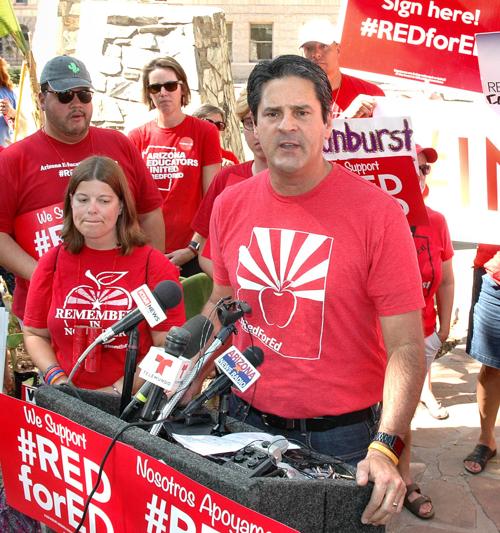PHOENIX — Voters will be told that a proposed income tax hike on the richest Arizonans to fund education also will affect taxpayers who earn a lot less.
But the effect on the average Arizonan would be nowhere near as much as the impact on those at the top of the income scale.
Maricopa County Superior Court Judge Connie Contes ruled that the evidence supports the argument that Proposition 207, if approved, would repeal a 2015 law designed to protect Arizonans from paying more income taxes solely because their wages keep pace with inflation.
The net effect in revenues is only a fraction of the $690 million a year that the Invest in Ed initiative is designed to raise by boosting income taxes on individuals earning more than $250,000 a year and couples with incomes exceeding $500,000.
Legislative budget staffers put the first-year cost to Arizona taxpayers of the repeal of inflation indexing at about $49 million.
To put that into perspective, that is only 1 percent of the $4.38 billion in individual income taxes expected to be collected this budget year.
Without future inflation indexing, however, those effects would grow, to the point that legislative budget staffers predict the cost in a decade would be $288 million. It is impossible to say what percent of the total income taxes owed by Arizonans that would be in 2028.
Contes’ ruling is a setback for initiative organizers, who argued that the entire burden of the plan for new education funding would fall on the top 1 to 2 percent of Arizona earners.
The judge’s ruling was not entirely a loss for initiative proponents, however.
Contes said Arizona law requires that explanations of ballot measures provide an accurate description and avoid advocacy. She said that explanation, which goes into brochures mailed to the homes of all 3.6 million registered voters, must be “an evenhanded assessment that does not omit, exaggerate, or understate material provisions.”
But Contes said the language crafted by a Republican-controlled committee effectively advocates that people vote against the measure by telling them they would be repealing a law “that protects taxpayers from paying more income tax due to inflation.”
Contes said the GOP lawmakers, who oppose the initiative, were overplaying the effect of the inflation-indexing provision. The judge called it an “ancillary issue” to the main focus of hiking income taxes on the most wealthy to fund education.
But Contes found no fault in lawmakers telling voters that the proposed 8 percent tax rate on earnings above $250,000 for individuals and $500,000 for couples will be increasing by 76.2 percent, with the 9 percent rate proposed on individual earnings above $500,000 and $1 million for married couples filing jointly translating out to 98.2 percent.
The current tax rate on those earnings is 4.54 percent. So initiative proponents had sought to have the change described as an increase of 3.46 and 4.46 percent, respectively, essentially the difference between the current and proposed rates. They argued the higher figures lawmakers sought to use in the description were designed to scare off voters.
Contes, however, said there’s nothing wrong with the analysis.
“This language is mathematically accurate and not misleading when considered in the contexts of each full sentence,” she said, pointing out the analysis does mention both the current and new rates. Anyway, Contes said, large percentage figures used in describing the impact on high-wage earnings “may be as or more likely to cause of voter to favor the initiative rather than against it.”
Attorney Jim Barton, who represents initiative supporters, said no decision has been made whether to appeal.
Whether the initiative even makes the ballot remains undecided.
Earlier this month, Maricopa County Superior Court Judge James Smith denied a bid by the Arizona Chamber of Commerce to keep the measure off the November ballot. He rejected the claim that initiative organizers misled people into signing petitions by understating the effects of the tax hike and failing to inform them that it also would affect income tax bracket indexing.
That case is now before the Arizona Supreme Court.





